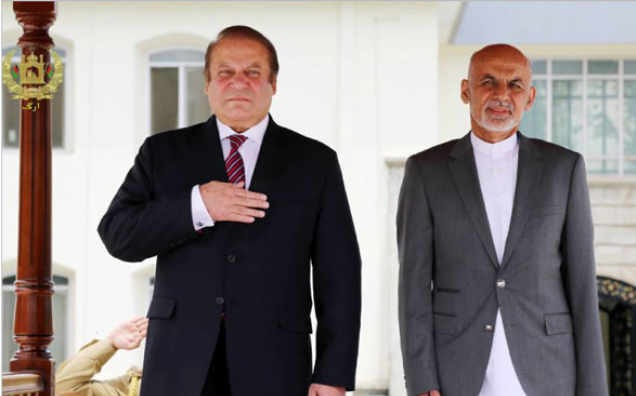“We need to identify cross-border terrorism and a fund to combat terrorism. Pakistan has pledged $500m for Afghanistan’s development. This amount can be spent to contain extremism. Afghanistan suffered the highest number of casualties last year. This is unacceptable... Some still provide sanctuary for terrorists. As a Taliban figure said recently, if they had no sanctuary in Pakistan, they wouldn’t last a month,” these words were spoken by Afghan President Muhammad Ashraf Ghani at the Heart of Asia Conference in Amritsar, India.
Terrorism is a highly challenging issue in Afghanistan which has inflicted heavy casualties upon Afghan combatants and non-combatants and triggered a sense of mistrust between the state and nation. Within the two last years, Afghan nation bore the brunt of casualties and a large number of people were disposed of on the grounds of their racial and religious backgrounds. The unmitigated militancy and stalemate of peace talks were the main reasons behind Ghani’s direct statements.
Insurgency has been mounted with the emergence of the self-proclaimed Islamic State of Iraq and the Levant (ISIL) and its affiliates. The Islamic State Khorasan Province (ISKP) has, reportedly, carried out countless attacks in the country, mostly targeting the ethnic minority groups. Since the terrorist activities of warring parties – including the Haqqani network, Al Qaeda, Islamic Movement of Uzbekistan, East Turkistan Islamic Movement, Lashkar-e-Taiba, Jaish-e-Mohammad, TTP, Jamaatul Ahrar, Jundullah – mushroomed in recent months, Ghani pursed his lips about Pakistan’s financial support and lashed out at Pakistan believing that a large number of terrorist networks enjoy safe haven in this country and orchestrate deadly attacks from across the border. On the other hand, however, Pakistan was applauded for hosting Afghan refugees for three decades.
It is an unmistakable fact that the Afghan-Pak relations hit rock bottom, mainly after the death of Omar’s successor Mullah Akhtar Mansour. When Pakistan failed to persuade the Taliban to come to negotiating table and militancy escalated in the country, a sense of mistrust aroused between Kabul and Islamabad. Afghan officials believed that Pakistan was not seeking a bona fide peace and did not use its “leverage” to put pressure on the Taliban elements. The establishment of Quadrilateral Coordination Group (QCG) was the last gleam of hope for Afghan authorities to hold a direct talk with the Taliban but it shattered too following the heated conflict ensued by Mansour’s death.
Islamabad constantly denied the claims made by Afghan government and shows tendency to break the stalemate. Pakistani Foreign Affairs Adviser Sartaj Aziz, who attended the Heart of Asia Conference, noted that the peace process for talks between the Afghan government and the Taliban has not yet produced positive results, adding that the option needed to be explored in a sustained way. He said, “In our view, there is no military solution to the Afghan conflict and all our efforts should be to achieve a politically negotiated settlement through an Afghan-led Afghan-owned process.”
Pakistani political pundits state that Pakistan’s foreign relation has been weakened and it is marginalized within recent months, especially after the cancellation of SAARC Summit in Islamabad in November. The repeated disapproval of Pakistan will damage its reputation at international level. So, Pakistan has realized this fact and seeks to strengthen its foreign relations suggesting to break the deadlock. To normalize the relation with Kabul, Islamabad must build a mutual trust through putting pressure on the Taliban to hold a genuine peace talks with Afghanistan. It is simply said that ‘actions speak louder than words’. An icy relation is not in favor of any countries, it is time for Pakistani officials to prove their words.
If Mullah Haibatullah shows a genuine intention of holding talks and reduces deadly attacks in Afghanistan’s soil, the Afghan-Pak relations will thaw. Secondly, Pakistan will not have to pressurize Afghan refugees or treat them with contempt for political reasons.
This fact should be considered that Pakistan is also the victim of terrorism and paid great sacrifices in this regard. For instance, Jamaat-ul-Ahrar (JuA), a splinter group of the Tehreek-e-Taliban Pakistan (TTP), inflicted heavy casualties upon Pakistani civilians and also claimed responsibility for August attack on Quetta’s Civil Hospital, which left more than 70 people killed and over 100 others wounded. Moreover, the ethnic minority groups come under severe attacks in Pakistan the same as our country.
Hence, since Afghanistan and Pakistan has common enemies, there is a dire need to amiable agreement for pursuing peace and stability. The blame game will further deteriorate the situation and let the terrorist networks muddy the water more than ever before. In addition, militancy will not be mitigated if the two countries continue blaming each other sarcastically. Despite mounting insurgency in the country, Afghan officials still call warring parties to stop violence and bloodshed and join peace talks – but peace agreement was signed only with Hezb-e-Islamic Afghanistan (HIA) led by Gulbuddin Hekmatyar.
In short, peace negotiation will be a pyrrhic victory for Afghan government as it has been less fruitful despite years of struggle. Since terrorist networks are changing into global threat, the world will have to combat terrorism with strong determination and pay especial heed to vulnerable countries, particularly Afghanistan which is historically considered the heart of Asia.
Home » Opinion » The Afghan-Pak Chilly Relations Linger
The Afghan-Pak Chilly Relations Linger
| Hujjatullah Zia

